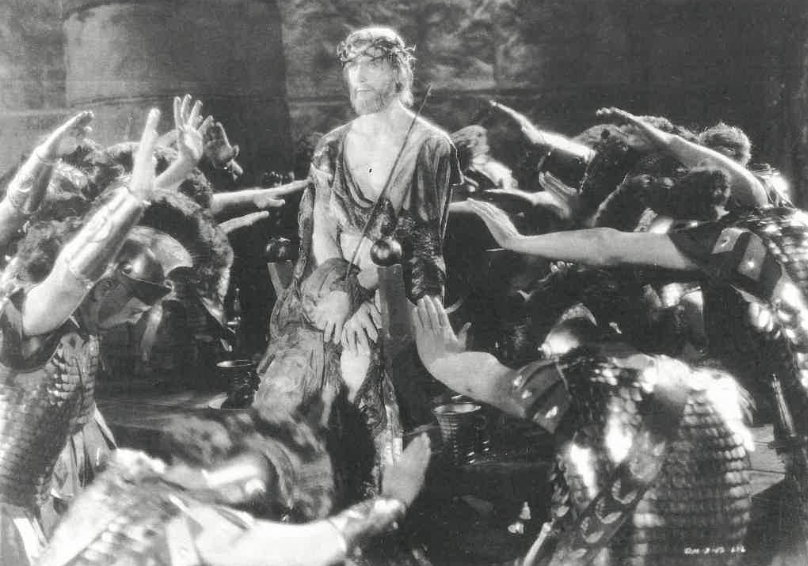Jesus Walking On Screen. Jesus in Film 1898 – 1993
JESUS WALKING ON SCREEN. Much strained, often sold, mostly ridiculed. Not only in the widescreen emporiums of the Promised Land, but also on other continents and under different frameworks than those of the New Testament and the Bible film crosses the screen. To free the genre from the limitations usually imposed on it by the relevant compendia: to show in a retrospective films that embed Jesus (often only in the form of brief guest appearances) in other spatial, temporal, and stylistic coordinate systems: This is what this retrospective attempts for the first time.
The first historical attempts, including the "Passion Play of Oberammergau" from 1898 - shot in New York - or the first major Bible film "From the Manager to the Cross" (1913, directed by Sidney Olcott) stand alongside Hollywood epics in Cinemascope and Technicolor.
Michael Brynntrup's German Super 8 collective epic "Jesus-Der Film" (1985/86) competes with George Steven's "Greatest Story Ever Told" (1965), which is brimming with US stars.
Erleuchtete Experimente by Robert Frank ("The Sin of Jesus," 1961), Kenneth Anger ("Scorpio Rising," 1963) or Daina Krumins ("Divine Miracle," 1973) stand up to unprejudiced scrutiny, as do the classic scandals sparked by Ken Russel with "The Devils" (1971) or Jean-Luc Godard with "Je vous salue, Marie" (1983).
Jesus in Ottakring, Montreal, Seoul, New York: his appearance is not bound to places. Two directors - D. W. Griffith and Pier Paolo Pasolini - are represented with three works each: Attempts to pin down individual continuities and ruptures in dealing with iconography. Also the great Jesus films by Cecil B. DeMille ("The King of Kings," 1927), Roberto Rossellini ("Il Messia," 1975) and Martin Scorsese ("The Last Temptation of Christ," 1988).
In view of a tremendously large creative complex, JESUS WALKING ON SCREEN is naturally a very subjective undertaking. Nevertheless, this exhibition does not shy away from digressions into zones free of Jesus, though related to the ductus of Jesus films.
"Hallelujah" (1929) by King Vidor tells a ballad from the black cotton-picking milieu with echoes of the story of salvation; Cuban Tomás Gutiérrez Alea arranges a caricature of the Last Supper around a despotic landowner in "La Ultima Cena" (1976); a hymn of selfless suffering is Veit Harlan's melodramatic masterpiece "Opfergang" (1944); in Roger Corman's chaotic disaster B-picture "Gas-s-s!" (1970), the Savior is allowed only off-screen discussions with his father. Andrey Tarkovsky places his "Andrey Rublyov" (1971) behind the foil of an icon of the Holy Trinity. One can especially look forward to the Austrian premiere of "The Rapture" (1991), a female quest for salvation in contemporary America, virtuously staged by Michael Tolkin, the author of Robert Altman's "The Player".
A total of 42 productions from 12 countries and a separate screening of Jesus-music videos in the foyer of Stadtkino are intended to awaken one thing above all: Interest in stories, which one, in the knowledge of the red thread more attentively, sometimes perhaps more skeptically lets affect oneself.
Films by Tomás Gutiérrez Alea, Kenneth Anger, Denys Arcand, Martin Arnold, Frank Borzage, Luis Buñuel, Michael Brynntrup, Roger Corman, Cecil B. DeMille, Abel Ferrara, Robert Frank, Samuel Fuller, Jean-Luc Godard, D. W. Griffith, Veit Harlan, Derek Jarman, Reinhard Jud, Henry Koster, Daina Krumins, André Maitre, N.N., Sidney Olcott, Manoel de Oliveira, Pier Paolo Pasolini, Wilhelm Pellert, Nicholas Roeg, Roberto Rossellini, Ken Russell, Hans Scheugl, Martin Scorsese, George Stevens, Andrej Tarkowskij, Michael Tolkin, Peter Tscherkassky, Blair Underwood, King Vidor, Henry C. Vincent, Son-U-Wan und Chang Son-U.
music videos by (among others) Mercury Rev, Jesus Lizard, Birthday Party, R.E.M., Ultra Vivid Scene, Depeche Mode, Sepultura, Sound Garden, God Bullies.
more information and program see downloads
Ein gemeinsames Programm von sixpackfilm und Stadtkino
Konzept und Text des Programmes Claus Philipp
Organisation der Filmreihe Gabriela Mühlberger in Zusammenarbeit mit Brigitta Burger-Utzer (sixpackfilm)

